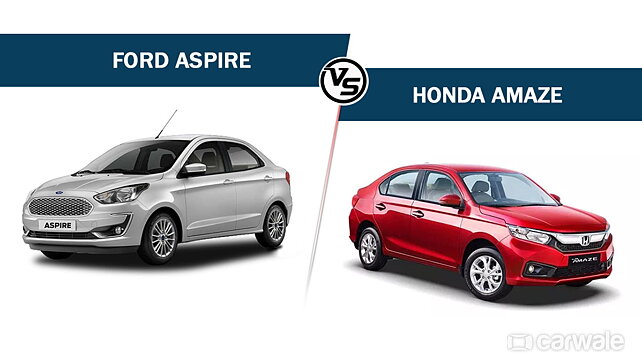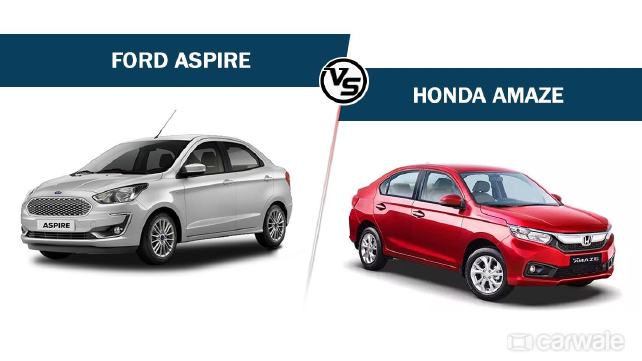
Competition in the compact sedan segment has intensified with new product launches. Recently, popular cars like the Ford Aspire and the Honda Amaze have been introduced in the country with a fresh set of cosmetic and feature upgrades. Read below to learn more about the key differences between the two cars.
Exterior
The newly launched Ford Aspire shares resemblance with the Freestyle crossover hatchback which was recently launched. The vehicle now gets a large hexagonal grille in the front with a chrome mesh which makes it look premium. The C-shaped chrome highlights on the bumper mark the front fog lamps while the headlamps unit has been carried over.
The new Honda Amaze now borrows styling cues from the latest generation of the Civic and the Accord. As compared to its predecessor, the new one gets a bigger hood which gives the car a more defined shape, along with LED headlamps, front fog lamps and 15-inch alloy wheels. The rear tail lamps have also been revised for freshness.
Interior
As for the interior, the new Aspire gets the new floating touchscreen display with SYNC3. There’s also the same beige and black treatment from its predecessor along with mild tweaks for freshness.
The new Honda Amaze borrows a few styling elements from its older siblings namely the Jazz, BR-V and the City. Speaking of features, it gets automatic climate control, electrically operated boot, engine start/stop button and welcome lights. The CVT option is also offered with paddle shifters.
Engine
Under the hood, the Ford Aspire is now available with a 1.2-litre, three-cylinder Dragon Series petrol engine that generates 95bhp of power and a new 1.5-litre, three-cylinder engine the generates 121bhp at 6500rpm and 150Nm at 4500rpm. The bigger petrol engine gets an optional new six-speed torque-converter automatic gearbox. The diesel version gets a 1.5-litre engine that generates 99bhp at 3750rpm and 215Nm between 1750-3000rpm.
Honda Amaze offers a CVT option in petrol as well as diesel engine options. The petrol version gets a 1.2-litre four-cylinder unit that generates 87bhp of power and 109Nm of torque. The diesel version, on the other hand, gets the older 1.5-litre four-cylinder unit that generates 100bhp/200Nm of torque.
[“source=TimeOFIndia”]





